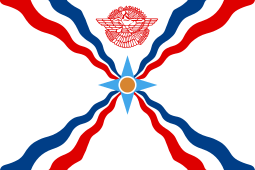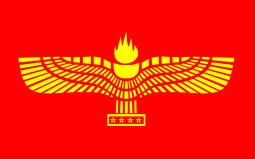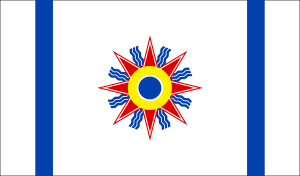Persecution of Christians by ISIL
The persecution of Christians by ISIL involves the systematic mass murder[8][9][10] of Christian minorities, within its region of control in Iraq, Syria and Libya by the Islamic extremist group Islamic State of Iraq and the Levant (ISIL). Persecution of Christian minorities climaxed following its takeover of parts of Northern Iraq in June 2014.[11]
| Persecution of Christians by ISIL | |
|---|---|
| Part of 2014 Northern Iraq offensive and Iraqi Civil War (2014-2017) | |
| Location | |
| Date | Ongoing |
| Target | mostly Assyrians, Arab Christians, Levantines, Armenians, Copts, and all Non-Muslims. |
Attack type | Genocidal massacre, religious persecution, ethnic cleansing, human trafficking and forced conversions to Sunni Islam. |
| Deaths | Thousands[1] |
| Victims | 135,000 Assyrian refugees[2] |
| Perpetrators | |
| Defenders | Syriac Military Council[3] Sutoro Qaraqosh Protection Committee[5] Dwekh Nawsha[6] Sootoro[7] Lebanese Armed Forces |
| Motive | Anti-Christian sentiment in the Middle East Wahhabi-Salafi extremism |
| Part of a series on |
| Persecutions of the Catholic Church |
|---|
|
Overview
|
|
|
According to US diplomat Alberto M. Fernandez, "While the majority of the victims of the conflict which is raging in Syria and Iraq have been Muslims, Christians have borne a heavy burden given their small numbers."[12]
On February 3, 2016, the European Union recognized the persecution of Christians by the Islamic State of Iraq and the Levant as genocide.[13][14][15][16] The vote was unanimous. The United States followed suit on March 15, 2016, declaring that these atrocities were genocide.[17] The vote was unanimous.[18] On April 20, 2016, the British Parliament unanimously voted to denounce these actions as genocide.[19] However, a similar motion failed in Canada when it was opposed by the majority of the MP's in Justin Trudeau's Liberal government.[20]
Background
The mass flight and expulsion of ethnic Assyrians from Iraq is a process which initiated with the start of the Iraq War in 2003 and continues to this day. Leaders of Iraq's Assyrian community estimate that over two-thirds of the Iraqi Assyrian population may have fled the country or been internally displaced from the U.S.-led invasion in 2003 until 2011. Reports suggest that whole neighborhoods of Assyrians have cleared out in the cities of Baghdad and Basra, and that Sunni insurgent groups and militias have threatened Assyrian Christians.[21] Following the campaign of the Islamic State of Iraq and the Levant in northern Iraq in August 2014, one quarter of the remaining Iraqi Assyrians fled the jihadists, finding refuge in Turkey and Iraqi Kurdistan.[22]
Timeline
Northern Iraq (2014)
After the fall of Mosul, ISIL demanded that Assyrian Christians living in the city convert to Islam, pay jizyah, or face execution, by July 19, 2014.[23][24][25][26][27] ISIL leader Abu Bakr al-Baghdadi further noted that Christians who do not agree to follow those terms must "leave the borders of the Islamic Caliphate" within a specified deadline.[26][27] This resulted in a complete Assyrian Christian exodus from Mosul, marking the end of 1,800 years of continuous Christian presence.[28] A church mass was not held in Mosul for the first time in nearly 2 millennia.[29]
ISIL has already set similar rules for Christians living in other cities and towns, including its de facto capital Raqqa.[30][31] However, on 29 March 2016, ISIL issued a decree preventing Christians from leaving Raqqa.
ISIL had also been seen marking Christian homes with the letter nūn for Nassarah ("Christian").[32][33] Several religious buildings were seized and subsequently demolished, most notably Mar Behnam Monastery.[34]
By August 7, ISIL captured the primarily Assyrian towns of Qaraqosh, Tel Keppe, Bartella, and Karamlish, prompting the residents to flee.[35][36] More than 100,000 Iraqi Christians were forced to flee their homes and leave all their property behind after ISIL invaded Qaraqosh and surrounding towns in the Nineveh Plains Province of Iraq.[37]
Libya (2015)
On February 12, 2015, the ISIL released a report in their online magazine Dabiq showing photos of 21 Egyptian Copts migrant workers that they had kidnapped in the city of Sirte, Libya, and whom they threatened to kill to "avenge the [alleged] kidnapping of Muslim women by the Egyptian Coptic Church".[38] The men, who came from different villages in Egypt, 13 of them from Al-Our, Minya Governorate,[39] were kidnapped in Sirte in two separate attacks on December 27, 2014, and in January 2015.[40]
Syria (2015)
On 23 February 2015, in response to a major Kurdish offensive in the Al-Hasakah Governorate, ISIL abducted 150 Assyrians from villages near Tell Tamer in northeastern Syria, after launching a large offensive in the region.[41][42]
According to US diplomat Alberto M. Fernandez, of the 232 of the Assyrians kidnapped in the ISIL attack on the Assyrian Christian farming villages on the banks of the Khabur River in Northeast Syria, 51 were children and 84 were women. "Most of them remain in captivity, with one account claiming that ISIS is demanding $22 million (or roughly $100,000 per person) for their release."[12]
On 8 October 2015, ISIL released a video showing three of the Assyrian men kidnapped in Khabur being executed. It was reported that 202 of the 253 kidnapped Assyrians were still in captivity, each one with a demanded ransom of $100,000.[43]
Reactions
On 2 and 3 August 2014, thousands of Assyrians of the diaspora protested the persecution of their fellow Assyrians within Iraq and Syria, demanding a United Nations-led creation of a safe haven for minorities in the Nineveh Plains.[44][45]
In October 2014, Kurdish-Danish human rights activist Widad Akrawi dedicated her 2014 International Pfeffer Peace Award "to all victims of persecution, particularly the Yazidis, the Christians, and all residents of the Kobanê region."[46] Chaldean Catholic Father Douglas Al-Bazi has spoken out strongly against the genocide.[47]
In December 2015, at a town hall event, the 67th United States Secretary of State, Hillary Clinton, called the systematic persecution a genocide.[48]
In February 2016, Lars Adaktusson, a Swedish member of the European Parliament from the EPP Group, said of the unanimous vote to recognize atrocities as genocide: "It gives the victims of the atrocities a chance to get their human dignity restored. It's also a historical confirmation that the European Parliament recognized what is going on and that they are suffering from the most despicable crime in the world, namely genocide."[14]
See also
- Armenian Genocide
- Assyrian Genocide
- Christianity in the Middle East
- Genocide of Yazidis by ISIL
- Persecution of Shias by ISIL
- Syrian Civil War spillover in Iraq
- Collaboration with ISIL
- Persecution of Copts
References
- "As Christians Flee, Governments Pressured to Declare ISIS Guilty Of Genocide". NPR. 24 December 2015.
At least a thousand Christians have been killed. Hundreds of thousands have fled.
- "Increasing Calls for Military Intervention to Save Assyrians and Yazidis". Aina.org. Retrieved 16 October 2014.
- "Syrien: Christen lassen sich von IS nicht vertreiben". Die Welt. 14 March 2015. Retrieved 14 March 2015.
- "Christians in Iraq Forming Militia to Defend, and Possibly Retake, Ancestral Lands". Aleteia. 4 December 2014.
- "Christian Security Forces Growing Stronger In Iraq". NPR. 2008-10-06. Retrieved 2012-04-08.
- "Christians reclaim Iraq village from ISIS". CBS News. United States. Associated Press. 13 November 2014. Retrieved 6 March 2015.
- Glioti, Andrea (20 June 2013). "Syriac Christians, Kurds Boost Cooperation in Syria". Al Monitor. Archived from the original on 2015-04-06. Retrieved 16 February 2015.
- Rodriguez, Meredith (August 8, 2014). "Chicago-area Assyrians march against ISIL, others protest airstrikes". Chicago Tribune. Archived from the original on August 9, 2014. Retrieved August 8, 2014.
- Bowcott, Owen; Jones, Sam (August 8, 2014). "Isis persecution of Iraqi Christians has become genocide, says religious leaders". The Guardian. Archived from the original on August 9, 2014. Retrieved August 8, 2014.
- McQuade, Romsin (July 30, 2014). "Iraq's persecuted Assyrian Christians are in limbo". The Telegraph. Archived from the original on August 9, 2014. Retrieved August 8, 2014.
- Levs, Josh (August 7, 2014). "Will anyone stop ISIS?". CNN. Archived from the original on August 7, 2014. Retrieved August 7, 2014.
- Fernandez, Alberto M. (June 16, 2015). "The "Sayfo" Continues Responding to Global Christian Persecution". Berkeley Center Cornerstone. Georgetown University Religious Freedom Project. Retrieved 20 June 2015.
- Moore, Jack (February 4, 2016). "European Parliament Recognizes ISIS Killing of Religious Minorities as Genocide". Newsweek.
- Kaplan, Michael (February 4, 2016). "ISIS Genocide Against Christians, Yazidis? European Parliament Recognizes Islamic State Targeting Religious Minorities". International Business Times.
The European Parliament characterized the persecution as "genocide" Thursday.
- JOINT MOTION FOR A RESOLUTION, European Parliament
- MEP's call for urgent action to protect religious minorities against ISIS, European Parliament
- Bruton, F. Brinley (March 17, 2016). "Kerry: ISIS Is Committing Genocide Against Yazidis, Christians and Shiite Muslims". NBC News.
- House Unanimously Passes Fortenberry ISIS Genocide Resolution Archived 2018-12-23 at the Wayback Machine, Mar 15, 2016
- "Isis is committing genocide against Yazidis and Christians, British MP's unanimously declare". 21 April 2016. Retrieved 27 October 2016.
- "Conservative motion to label ISIS actions genocide fails as Liberals vote against". Retrieved 27 October 2016.
- "Population 'under attack'". Radio Free Europe. Archived from the original on 7 September 2012. Retrieved 18 June 2012.
- "BBC News - Iraq Christians flee as Islamic State takes Qaraqosh". BBC News. 7 August 2014. Retrieved 16 October 2014.
- "BBC News - Iraqi Christians flee after Isis issue Mosul ultimatum". BBC News. 18 July 2014. Retrieved 13 February 2015.
- van Tets, Fernande (7 August 2014). "Isis takes Iraq's largest Christian town as residents told – 'leave, convert or die'". The Independent. Retrieved 5 January 2015.
- Jadallah, Ahmed (18 July 2014). "Convert, pay tax, or die, Islamic State warns Christians". Reuters. Retrieved 5 January 2015.
- Erb, Kelly Phillips (19 July 2014). "Islamic State Warns Christians: Convert, Pay Tax, Leave Or Die". Forbes. Retrieved 4 July 2016.
- "Convert, pay tax, or die, Islamic State warns Christians". Reuters. 18 July 2014.
It said that Islamic State leader Abu Bakr al-Baghdadi, whom the group has now named Caliph Ibrahim, had set a Saturday deadline for Christians who did not want to stay and live under those terms to "leave the borders of the Islamic Caliphate". "After this date, there is nothing between us and them but the sword," it said.
- "For the first time in 1,800 years, no Masses said in Mosul". Catholicworldreport.com. Retrieved 16 October 2014.
- "Iraqi Christian church burnings confirmed by EU delegation". Iraq news, the latest Iraq news. Retrieved 13 February 2015.
- Abedine, Saad; Mullen, Jethro (28 February 2014). "Islamists in Syrian city offer Christians safety – at a heavy price". CNN. Retrieved 27 July 2014.
- Hubbard, Ben (23 July 2014). "Life in a Jihadist Capital: Order With a Darker Side". The New York Times. Retrieved 27 July 2014.
- "Iraqi Christians flee after Isis issue Mosul ultimatum". BBC News. August 7, 2014. Archived from the original on July 24, 2014. Retrieved August 7, 2014.
- Loveluck, Louisa (August 7, 2014). "Christians flee Iraq's Mosul after Islamists tell them: convert, pay or die". The Telegraph. Archived from the original on July 30, 2014. Retrieved August 7, 2014.
- "Isis militants 'seize Iraq monastery and expel monks'". BBC News. August 7, 2014. Archived from the original on July 24, 2014. Retrieved August 7, 2014.
- "UN Security Council condemns attacks by Iraqi jihadists". BBC News. August 7, 2014. Archived from the original on August 8, 2014. Retrieved August 7, 2014.
- "ISIS Captures Largest Christian Town in Iraq and Several Others, Thousands of Minorities Flee". International Business Times. 7 August 2014. Retrieved 16 October 2014.
- "BBC News - Iraq Christians flee as Islamic State takes Qaraqosh". BBC News. 7 August 2014. Retrieved 13 February 2015.
- El-Gundy, Zeinab (12 February 2015). "Islamic State publishes report on Coptic Egyptian workers kidnapped in Libya". Al-Ahram. Retrieved 16 February 2015.
- "Thousands mourn Egyptian victims of Islamic State in disbelief". Reuters. 16 Feb 2015. Retrieved 26 Feb 2015.
- "ISIL video shows Christian Egyptians beheaded in Libya". Al Jazeera. 16 Feb 2015. Retrieved 16 Feb 2015.
- Suleiman Al-Khalidi; Oliver Holmes (23 February 2015). Tom Heneghan (ed.). "Islamic State in Syria abducts at least 150 Christians". Reuters. Retrieved 23 February 2015.
- "Islamic State 'abducts dozens of Christians in Syria'". BBC. 23 February 2015. Retrieved 23 February 2015.
- "Isis appears to have killed three Christian hostages in Syria". The Guardian. 8 October 2015. Retrieved 17 August 2018.
- "Thousands rally against 'silent genocide'". 2 August 2014. Retrieved 27 October 2016.
- "Assyrians Demonstrate Worldwide Against ISIS Persecution". Aina.org. Retrieved 16 October 2014.
- Kelly, Linda (22 October 2014). "Dr. Widad Akrawi Receives the Pfeffer Peace Award". Fellowship of Reconciliation. Archived from the original on 19 October 2015. Retrieved 18 November 2015.
- Simov, Stoyan (15 March 2016). "Iraqi Priest Who Terrorists Smashed Face With Hammer: US Must Recognize Christian Genocide". Christian Post. Retrieved 16 September 2016.
- George Thomas (2 February 2016). "'It's Genocide,' Europe Says of Christian Slaughter by ISIS". Christian Broadcasting Network.
"I'm sure now we have enough evidence that what is happening is genocide, deliberately aimed at destroying, not only the lives but wiping out the existence of Christians, Yazidis, and other religious minorities in the Middle East in territory controlled by ISIS," she said.


